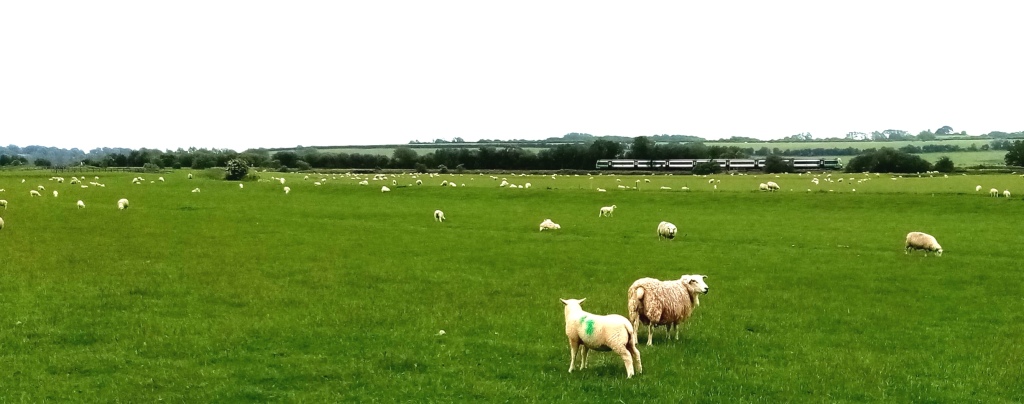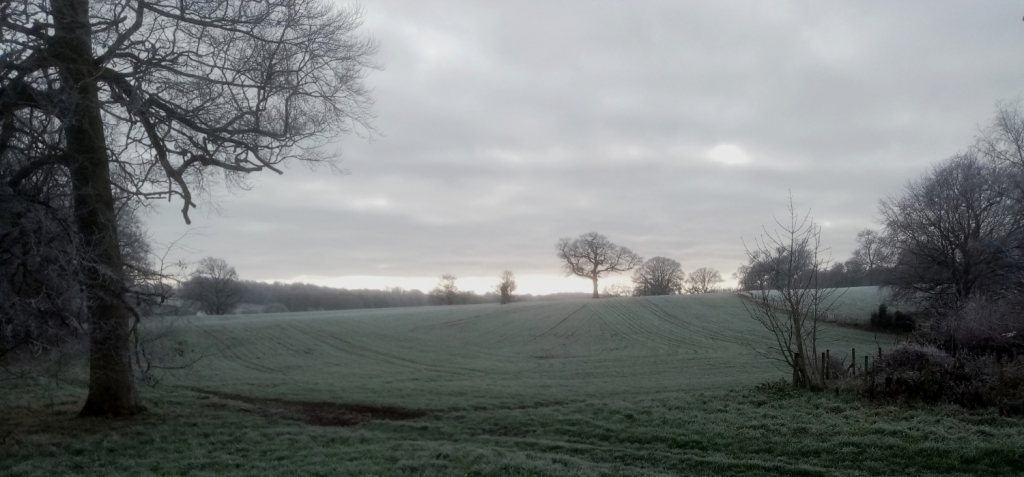Climb Every Mountain by Oliver Cheeseman
Part of me never thought I would get to the top of a real mountain, but I did! It was all down, or up, to team work and modern wheelchair technology.
I was a bit unsure about getting into the ATW, or All Terrain Wheelchair, that Mr Kipling produced at the Mountain Centre. It had fat tyres, a balloon wheel bogey at the front, rear suspension, a low seat and extending push bars. Mr Kipling said it was very stable. I hoped he was right.
It was hard work with those tyres and I needed plenty of help. Mr Cockle pushed me first, but not for long. He went rather fast and I was quite shaken, even with the suspension. I think he was showing off a bit in front of the girls.
Nerys took over, helping me on the rough parts of the track. We passed a lot of sheep and lambs. l’d never seen them so close before. The mothers took great care and called to their babies when we went by. Nerys called them woolly maggots, because they ruined the countryside. She showed me what looked like abandoned gardens or fields, with low walls and thorn bushes scattered among them. ‘Ruined by sheep,’ she said. ‘No hedges left hardly. ‘
Mr Turnstone began reciting poetry again as we came to a closed up cottage:
Once again I see
These hedge-rows, hardly hedge-rows, little lines
Of sportive wood run wild: these pastoral farms,
Green to the very door; and wreaths of smoke
Sent up, in silence, from among the trees!
Then it began to get steeper and rockier. The ATW had lashing points so people could pull with ropes or hang on to stop me from rolling away downhill. It got really tough once we got above the trees. I was glad to see that Ellis had big chocks slung round his neck, which he whipped under my wheels, whenever we stopped. Brakes don’t always work so well when wheels get muddy, and some of the slopes were steep; I began to worry about the chair tipping over backwards, even though it had a very low centre of gravity.
The path got narrower and narrower and harder to get along. Sometimes I was pulled up backwards. Sometimes I was carried high on people’s shoulders, using the poles. The views were terrific but the views of my face on Mr Turnstone’s video are terrified!
Then we turned onto a rocky ridge that seemed to go on for ever, with a long drop to either side. The going was not so bad on the grass. I had the Hogbens pushing and pulling and Scruffy taking a rest on my knees. Then, as it got steeper, everyone seemed to be helping to push, pull, or balance the ATW, using ropes, bars and any corner they could lay hands on. Everyone but Mr Cockle, who was shouting orders and advice from the rear. Stacey got filthy, turning one wheel with her bare hands. I ruined two pairs of gloves.
At the top everyone was exhausted, including me. “Even though you’ve been sitting down for the last few hours,” said Mr Turnstone. But next thing everyone was standing, jumping, dancing, with their arms round each other.
“Come on Dazza, let’s get him up,” said Dean, and the next I knew the two of them were lifting me out of the chair and I was standing on top of the world with Scruffy round my neck.
You get a lovely view from the top of Penyfan, or as Mr Turnstone says, at least when it’s not raining or misty. The lake looked tiny, and the people beside it were like ants. The hills and mountains around us were all colours of green and brown.
On the way down we stopped at a granite column to have a drink. Mr Turnstone said he wanted us to look all around and listen. He said it would make sense of the awful homework Miss Treacy had set. “Don’t spoil it, Sir,” said Gemma.
I don’t think he did. This is what he read:
. . . here I stand, not only with the sense
Of present pleasure, but with pleasing thoughts
That in this moment there is life and food
For future years. And so I dare to hope,
Though changed, no doubt, from what I was when first
I came among these hills; when like a roe
I bounded o’er the mountains, by the sides
Of the deep rivers, and the lonely streams,
Wherever nature led: more like a man
Flying from something that he dreads, than one
Who sought the thing he loved. For nature then
(The coarser pleasures of my boyish days,
And their glad animal movements all gone by)
To me was all in all. – I cannot paint
What then I was. The sounding cataract
Haunted me like a passion: the tall rock,
The mountain, and the deep and gloomy wood,
Their colours and their forms, were then to me
An appetite; a feeling and a love,
That had no need of a remoter charm,
By thought supplied, nor any interest
Unborrowed from the eye.
Mr T gets carried away sometimes. I’ve known the head slam his classroom door when he was reading Shakespeare to us, along with the rest of the corridor, but there were no doors up here, and no-one to complain, except the PE teachers.
I wasn’t the only one who had an appetite. Gemma said she had one and Mr Turnstone laughed and said she should enjoy the coarser pleasures of her girlish days while she could and Gemma blushed and said he was horrible. We all had chocolate and juice. “Don’t leave your paper about”, shouted Mr Cockle, and at that moment the wind grabbed Mrs Cockle’s empty carrier bag and lifted it over our heads. Nothing to be done about it, but Dean raised a cheer from us all.
Help! On the way down Mr Turnstone said he was tempted to let me roll but he’d best hang on for dear life. “Thanks!” I said. “It’s not your life I’m worried about,” he said, “it’s mine. I promised your dad I’d bring you back in one piece. He might get cross if I don’t. And think of all the paperwork! Anyway, I believe Mr Cockle has a date with a sounding cataract.”
I think the climb was worth it, even if we were all exhausted at the top, except Mr Cockle. He told us he had to do a running risk assessment and scout the best route for the last stretch to the summit, which is why he had plenty of breath to shout at everyone else. Now he dashed off ready to drive the Land Rover up to the stream crossing point.

















